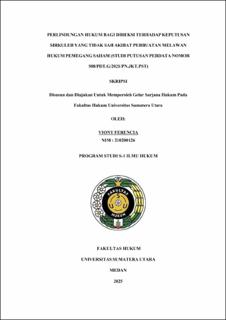| dc.description.abstract | A circular resolution is an alternative if shareholders are unable to hold a
GMS either directly or indirectly. Normatively, a circular resolution requires the
approval of all shareholders to have the same legal force as an AGM, as stipulated
in Article 91 of the Company Law. However, in practice, not all corporate bodies
comply with these requirements, leading to unlawful acts, as seen in Decision No.
508/Pdt.G/2021/Pn. Jkt.Pst regarding the replacement and dismissal of board
members, as well as approval to change the share structure of PT. FMJ through a
circular resolution that was not approved by all shareholders. The method used is
normative law. The nature of the research is prescriptive, using secondary data
obtained through data collection and analysis techniques. The research approach
uses a legal approach, a case approach, and a comparative approach.
The results of the study indicate that legal protection for directors, particularly
regarding the replacement and dismissal of directors through circular resolutions, is
not yet optimal. This is because the regulations regarding circular resolutions in
Indonesia are currently limited to only one article, and there are no further
regulations regarding procedures, time frames, or restrictions on the use of circular
resolutions, which could potentially lead to legal uncertainty and suboptimal legal
protection for directors of PTs in Indonesia. Therefore, to ensure legal certainty and
optimal legal protection for directors, clearer and more explicit regulations
regarding circular resolutions are needed, along with strengthening the role of the
Director General of AHU as the selector of PT articles of association. | en_US |


